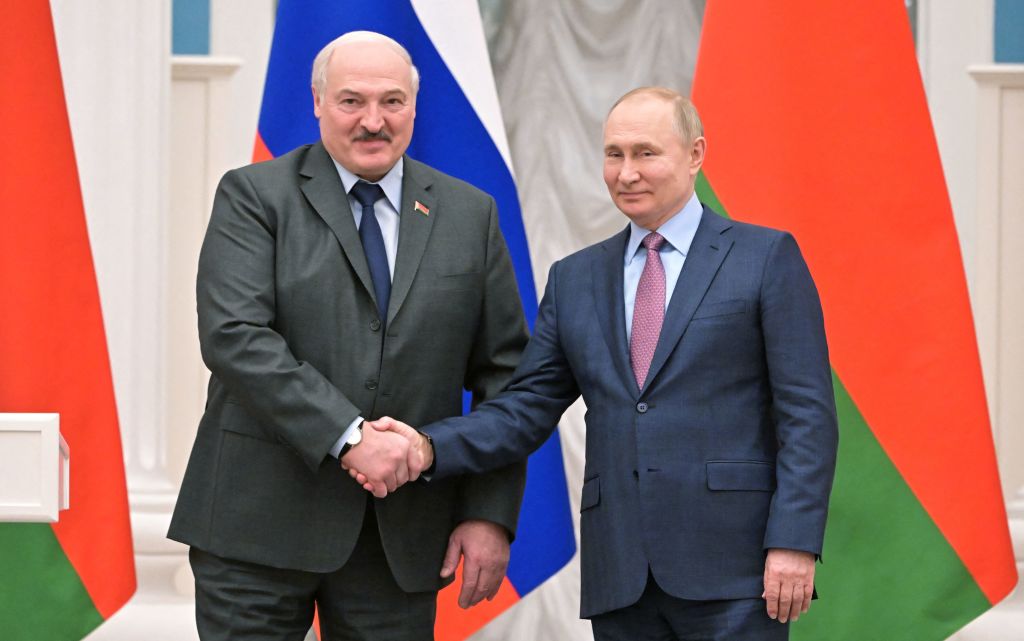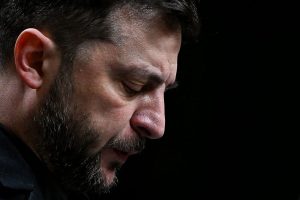A young man wearing combat fatigues and an extravagant mustache, and carrying a heavy machine-gun over his shoulder, nods towards some burned-out armored vehicles. “We smashed the orcs today,” he says, using the Ukrainian soldiers’ term for the invading Russians, a reference to the sub-human legion in Tolkien’s The Lord of the Rings. He goes on: “Putin, you are a dickhead — your Greater Russia will die together with you.” The soldier — his uniform has a badge saying “Ivanov” in Cyrillic — is not, in fact, Ukrainian. He is one of a small number of volunteers from Belarus, next door, a country that is certainly part of the Greater Russian project. But if Ukraine pushes back the Russian invasion, it is just possible that Belarus, too, could slip from Vladimir Putin’s grasp.
Ivanov is speaking on a video released by the Kastuś Kalinoŭski Battalion, named after the young lawyer, journalist and revolutionary who led a nineteenth-century uprising against the “Muscovite empire.” Kalinoŭski’s small band of rebels were overwhelmed by 120,000 well-equipped Russian troops and he was publicly executed at the age of twenty-six. In the battle for Ukraine today, the Kremlin’s plan was also to overwhelm the opposition with a larger, better-equipped force. Ivanov says he is not afraid of attacking the Russian army even though he and his comrades have so little to fight with — just one tank and two “BMP” Soviet-era armored vehicles between them. “We are a free people. We have nothing to be afraid of. We are fighting for truth. As you can see, victory is ours.”
The Kalinoŭski Battalion was formally incorporated into the Ukrainian armed forces last month, but it still flies the red and white flag of the pre-Soviet People’s Republic of Belarus. Their motto is: “First Ukraine, then Belarus.” The idea that the volunteers could turn around one day and march back to liberate Minsk is a bit fanciful: there are probably just a few hundred of them fighting in Ukraine. Ivanov knows he’s appearing in a propaganda video and that a bit of chest-thumping is required. But his elation is genuine: as the video seems to show, the Belarusians, along with some Georgians, have pushed the Russian invaders out of a village some forty miles east of Kyiv. Anyway, the real message of the video is those burned-out armored vehicles. It’s a message that has been clearly understood in Minsk.
The Belarusian leader, Alexander Lukashenko, may call the volunteers “crazed citizens” but he has a healthy respect for the dangers of sending armed forces into Ukraine to support Putin’s war. A month ago, there were reports he had bowed to intense pressure from the Kremlin to join the invasion — but then nothing happened. Belarus has a small army, around 45,000 strong, and even then it might be able to put only 10,000 troops in the field. These soldiers have never seen combat; they haven’t even got experience of a UN peacekeeping mission somewhere. Their armored vehicles are older and more decrepit than the Russians’. Altogether, the Belarusian armed forces are vastly smaller, weaker and almost certainly more incompetent than the Russians. They could be expected to perform worse and suffer more than the Russian troops in Ukraine.
Siarhei Pelesa, a journalist and activist who supports the volunteer fighters, told me that an official Belarusian military expedition would not survive the shock to morale of its first casualties. A lot of soldiers would simply give themselves up — the Belarusian opposition has published handy instructions on how to surrender to the Ukrainian forces. I asked him if he thought the Belarusian army would stage a mutiny if ordered into Ukraine. He replied: “We don’t know what they will do if they are told go to the south. Nobody knows how our army will behave.”
But Belarus is already part of Russia’s war. A large part of the invading Russian army used Belarus as a staging area, tens of thousands of troops passing through on their way to Ukraine. Now the broken and bloodied forces retreating from Kyiv could use Belarus as a safe area to patch themselves up and regroup for a counter-attack. The Ukrainian defense ministry says Russian troops are also using Belarus to host a bazaar for looted goods: you can buy washing machines, dishwashers, refrigerators, motorcycles, carpets and children’s toys, all stolen from Ukrainian homes. Belarusian activists have published the records of a shipping company that sent two tons of stolen goods back to Russia in a single day: “Kovalenko E, 450kg, hi-fi speakers, table, tent; Nikolaev A, 205kg, TV, armchair; Stepanov N, 140kg, air conditioners, spare parts; Shulaikin N, 60kg, fishing tackle, clothing.”
More seriously, some of the Russian missiles still landing on Ukrainian cities are fired from Belarusian territory. President Lukashenko has even made it possible for the Kremlin to base nuclear weapons in Belarus. He has forced through changes to the constitution to abandon the country’s nuclear-free status. Russia has already succeeded in extinguishing the sovereignty of one neighboring state, and it’s not Ukraine.
Most of Belarus, and many of President Lukashenko’s own supporters, oppose the invasion. So there have been “resistance activities” inside Belarus: military convoys blocked, railway lines to Ukraine sabotaged, government websites hacked by “cyberpartisans,” and demonstrations against the war, leading to mass arrests. The official opposition — now calling itself a government in exile — confidently predicts that these will grow and will end with a “free Belarus.”
A democracy activist I will call Marina is not quite so optimistic. She’s a grandmother in her sixties and campaigns to free political prisoners — there are said to be more than 1,000 in Belarus. She was arrested in front of her family on what has the appearance of being a trumped-up charge of tax evasion. She was interrogated for more than twenty-four hours without food or a break, she says. Then, when the police failed to obtain a confession, she was detained for the better part of a year, without being convicted of any crime. She fled Belarus after being released, fearing it was only a matter of time before the authorities arrested her again. President Lukashenko has been called “Europe’s last dictator” — he is widely believed to have rigged their 2020 presidential election. Marina and her fellow activists call him “the cockroach” — he always seems to survive, whatever happens.
Unlike the opposition’s government in exile, Marina doesn’t see change in Belarus as inevitable — at least not without something dramatic happening on the battlefield in Ukraine. But if Russia were to be defeated there, leading to regime change in Moscow, then regime change in Belarus would follow, she believes. One of President’s Lukashenko’s two pillars of support — Putin — would be gone. The other pillar, the secret police and the security forces, would buckle. Change would come fast.
“Everything depends on Ukraine and whether Ukraine wins,” she says. The Kalinoŭski Battalion and other Belarusian volunteers are, then, fighting for three countries: Ukraine, Russia and their own.
This article was originally published in The Spectator’s UK magazine. Subscribe to the World edition here.

























